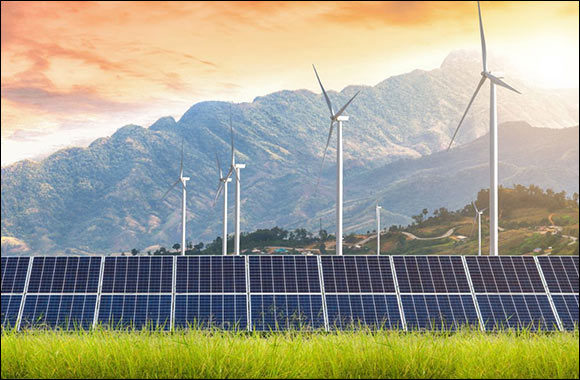
Renewables Competitiveness Accelerates, Despite Cost Inflation
Global power sector saved fuel costs of USD 520 billion last year thanks to renewables, says new IRENA report
Abu Dhabi, United Arab Emirates, 29 August 2023 – The fossil fuel price crisis has accelerated the competitiveness of renewable power. Around 86 per cent (187 gigawatts) of all the newly commissioned renewable capacity in 2022 had lower costs than fossil fuel-fired electricity.
Renewable Power Generation Costs in 2022, published by the International Renewable Energy Agency (IRENA) today shows that the renewable power added in 2022 reduced the fuel bill of the electricity sector worldwide. New capacity added since 2000 reduced the electricity sector fuel bill in 2022 by at least USD 520 billion. In non-OECD countries, just the saving over the lifetime of new capacity additions in 2022 will reduce costs by up to USD 580 billion.
In addition to these direct cost savings, there would be substantial economic benefits from reducing CO2 emissions and local air pollutants. Without the deployment of renewables over the last two decades, the economic disruption from the fossil fuel price shock in 2022 would have been much worse and possibly beyond many governments ability to soften with public funding.
IRENA’s new report confirms the critical role that cost-competitive renewables play in addressing today’s energy and climate crises by accelerating the transition in line with the 1.5°C warming limit. Renewables represent vital planks in countries’ efforts to swiftly reduce, and eventually phase out, fossil fuels and limit the macroeconomic damage they cause in pursuit of net-zero emissions.
IRENA’s Director-General Francesco La Camera said: “IRENA sees 2022 as a veritable turning point in the deployment for renewables as its cost-competitiveness has never been greater despite the lingering commodity and equipment cost inflation around the world. The most affected regions by the historic price shock were remarkably resilient, in large part thanks to the massive increase of solar and wind in the last decade.”
“Today, the business case for renewables is compelling, but the world must add 1 000 GW of renewable power annually on average every year until 2030 to keep 1.5°C within reach, more than three times 2022 levels. There is no time for a new energy system to evolve gradually as was the case for fossil fuels. In preparation of the COP28 in Dubai later this year, today’s report shows once again that with renewables, countries have the best climate solution at hand to raise ambition and take actions in a cost-competitive way.”
Commodity and equipment cost inflation in 2022 resulted in countries experiencing markedly different trends in costs in 2022, IRENA’s new report finds. However, at a global level, the weighted-average cost of electricity fell for utility-scale solar PV by 3 per cent, for onshore wind by 5 per cent, for concentrating solar power by 2 per cent, for bioenergy by 13 per cent and for geothermal by 22 per cent.
Only the costs for offshore wind and hydropower increased by 2 per cent and 18 per cent respectively, due to the reduced share of China in offshore wind deployment in 2022 and cost overruns in a number of large hydropower projects.
For the last 13 to 15 years, renewable power generation costs from solar and wind power have been falling. Between 2010 and 2022, solar and wind power became cost-competitive with fossil fuels even without financial support. The global weighted average cost of electricity from solar PV fell by 89 per cent to USD 0.049/kWh, almost one-third less than the cheapest fossil fuel globally. For onshore wind the fall was 69 per cent to USD 0.033/kWh in 2022, slightly less than half that of the cheapest fossil fuel-fired option in 2022.
IRENA’s report concludes that expected high fossil fuel prices will cement the structural shift that has seen renewable power generation become the least cost source of new generation, even undercutting existing fossil fuel generators. Renewables can protect consumers from fossil fuel price shocks, avoid physical supply shortages and enhance energy security.
Home >> Energy and Industry Section
Hala Badri: showCACE 2025 is an Innovative Platform that Highlights the Power of ...
Mohammed Bin Rashid Library Welcomes Delegation From Ministry of Health and Prev ...
RAK Ruler supports RAKEZ and AHK strategic partnership
High-Level Russian Delegation Visits Mohammed Bin Rashid Library to Discuss Stra ...
Calling All Cosplay Fans! Bring Gaming Characters to Life at DEF's Dubai Cosplay ...
Sayward Capital Corp. Signs Definitive Agreement with Technosteel Construction ( ...
24th Dubai Airport Show concludes on overwhelming response from aviation industr ...
Dubai Land Department reinforces principles of transparency and promotes a cultu ...
UAE and Bahrain Announce Entry into Force of the Investment Promotion and Protec ...
Emirates Group achieves record profit of AED 22.7 bn (US$ 6.2 bn) in 2024-25
Dubai Health Authority launches NABIDH Clinical Portal Training to Enhance Healt ...
Tashkeel Launches Summer CampProgramme 2025 with Hands-On Creative Workshops Led ...
Fakhruddin Properties Launches Dubai's First In-Building Waste Management System ...
NEOM launches 'Champions of Progress' initiative with AFC support to develop foo ...
UAE Team Emirates-XRG take aim at defending Giro d'Italia title as Grand Tour se ...
Global Police Leaders, Decision-Makers, and Technology Experts to Convene in Dub ...
DAE Completes US$2.0 billion Acquisition of Nordic Aviation Capital
Organised in strategic partnership with HOUSE of PIANOS and Steinway & Sons Duba ...
UAE Launches First National Food Loss and Waste Baseline Study
DoubleTree by Hilton Sharjah Waterfront Hotel & Residences Partners with GEMS Ed ...
